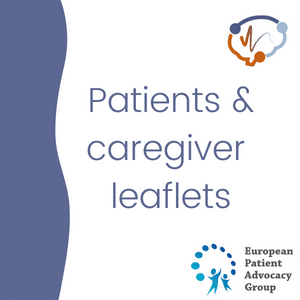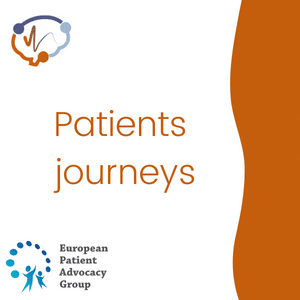Resources on rare epilepsies
EpiCARE’s ePAG, the patient representatives, care to produce documents to help patient through their diagnosis, their communications with healthcare professionals and even with their close ones.
In collaboration with EpiCARE clinicians, they prepared two kinds of documents : patient leaflets and journeys. The leaflets are a informative document about a specific diseases, in 2 parts: one for the patients and their carers and families, and one for healthcare professionals. In each leaflet, you will be able to learn about the prevalence, diagnosis, treatment options… of rare and complex epilepsies. Secondly, patients journeys are also being developped. They illustrate the journey through the diagnosis, providing a kind of map from the perspective of those living with a rare and complex epilepsy.
Rare epilepsies Leaflets
Patient and caregivers leaflets are developed to give precise and accessible informations on rare and complex epilepsies. With one part for healthcare profesionnals, and one part for patients and their families or carers, these documents detail comprehensively what to expect when facing a rare epilepsy, and how to manage care.
Unless mentioned otherwise, all leaflets are in english. We are working on translating them in as many languages as possible with the help of patients associations all over Europe, so check back regularly!
Here you can download Leaflets in different languages:

- Dravet Syndrome
Versions: English (EN) / Italiana (IT) /Română (RO) / Hrvatska (HR) / Deutsche (DE) / Norsk (NO) / Srpska (RS) / Svensk (SE)
- Hypothalamic Hamartoma
Versions: English (EN) / Roman (RO) / Hrvatska (HR)
- Ring Chromosome 20 Syndrome
Versions: English / Hrvatska (HR) / ελληνική έκδοση (GR) / Lietuviška (LT) / Española (ES)
- Alternating Hemiplegia of Childhood
Versions: English (EN) / Hrvatska (HR) / Italiana (IT) / Española (ES) / Française (FR)
- GLUT1 Deficiency Syndrome
Versions: English (EN) / Hrvatska (HR) / Română (RO) / Deutsche (DE) / Italiana (IT)
- CDKL5 Deficiency Disorder
Versions: English (EN) / Española (ES) / Portuguesa (PT) / Hrvatska (HR) / Română (RO)
- Lennox-Gastaut Syndrome
Versions: English (EN) / Română (RO) / Hrvatska (HR)
- SYNGAP1
Versions: English (EN) / Română (RO) / Hrvatska (HR)
- RETT Syndrome
Versions: English (EN) / Hrvatska (HR)
- Infantile Epileptic Spasms Syndrome
Versions: English (EN) / Hrvatska (HR)
- STXBP1
Versions: English (EN) /Hrvatska (HR)
These documents are being developed progressively. New ones should be added soon.
Rare epilepsies Patients Journeys
Rare epilepsies patient’s journeys describe the specific needs and goals of a patient’s path for a rare or complex epilepsy. They describe the health-care pathway and provide a key perspective of those living with a rare disease. In consequence, they allow for a constructive discussion between clinicians and patients.
The ePAG advocates made these journeys available by mapping the needs and expectations for each stage of the care pathway, for 4 rare and complex epilepsies so far.
Read and download the following patients journeys :

- Dravet Syndrome
Versions: English (EN) / Dansk (DK) / Hrvatska (HR) / Italiana (IT) / Slovenska (SI) / Serbian (RS) / Norsk (NO) / Portuguesa (PT)
- Hypothalamic Hamartoma
Versions: English (EN) / Hrvatska (HR) / Româna (RO) / Portuguesa (PT)
- Alternating Hemiplegia of Childhood
Versions: English (EN) / Hrvatska (HR) / Italiana (IT) / Española (ES) / Française (FR) / Portuguesa (PT)
- KCNQ2
Versions: English (EN) / Italiana (IT) / Hrvatska (HR) / Portuguesa (PT)
- GLUT1
Versions: English (EN) / Hrvatska (HR) / Deutsche (DE) / Italiana (IT) / Portuguesa (PT)
- STXBP1
Versions: English (EN) / Hrvatska (HR) / Portuguesa (PT)
- SYNGAP1
Versions: English (EN) / Hrvatska (HR) / Portuguesa (PT)
- GRIN
Versions: English (EN) / Hrvatska (HR) / Portuguesa (PT)
- PCDH19
Versions: English (EN) / Hrvatska (HR) / Portuguesa (PT)
Please note that these documents are being developed progressively. We will add more regularly.
Emergency Protocols
- Emergency Protocol for Dravet syndrome – Platform built to help clinicians/carers to prepare a tailor-made emergency protocol for people affected by Dravet Syndrome.
- Glut1 Deficiency syndrome emergency protocol – Guidelines provided by BIMDG on behalf of Orphanet.
- Tuberous Sclerosis ermergency guidelines – This document is a translation of the French recommendations drafted by Dr. M. Chipaux, reviewed and published by Orphanet in 2007.
Other resources
- Epilepsy & Pregnancy : A European Survey report published by the International Bureau for Epilepsy.
- Farmacos en camino para el sindrom de Dravet – resumen fin de 2021 (Versión española).
- Speak up. Listen up. Follow up: a brief guide for rare disease patient organisations on how to listen to the community.
- Patient journeys : A Tool to Raise Awareness on the Evolution, Common Needs and Critical Issues of Patients with Rare and Complex Epilepsies: poster presented at the IEC 2023 in Dublin by the ePAGs.
- Alternating Hemiplegia of Childhood (AHC): Full Text Patient Journey.

